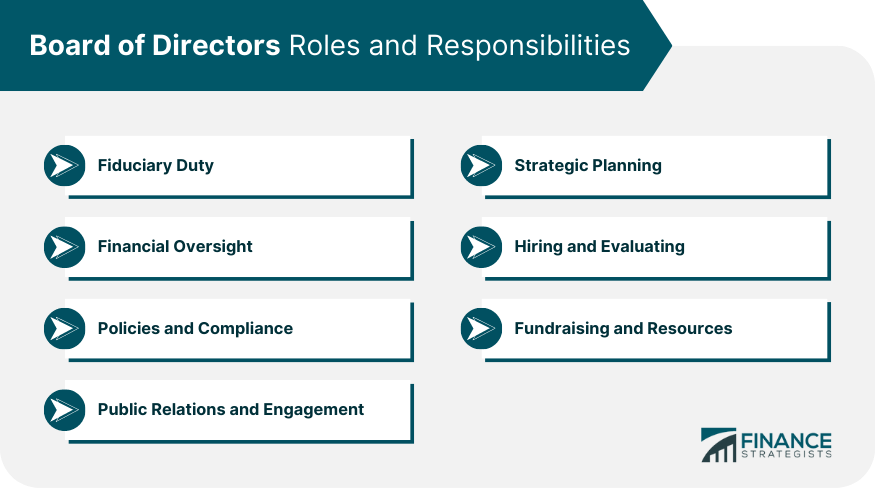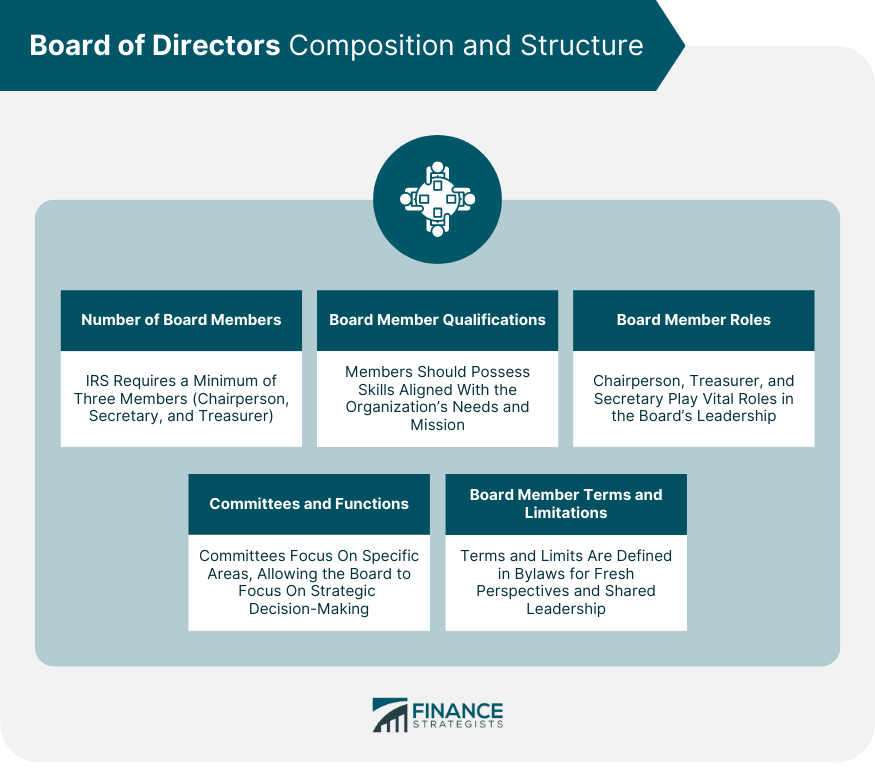A 501(c)(3) board of directors is a group of individuals who are responsible for overseeing the operations of a nonprofit organization that has been granted tax-exempt status by the Internal Revenue Service (IRS). The board is responsible for ensuring that the organization complies with all applicable laws and regulations and that it is carrying out its mission and purpose in a responsible and effective manner. The board is also responsible for setting the organization's overall direction, approving its budget, and hiring and evaluating its executive director. The board members are typically volunteers who are drawn from a variety of backgrounds, but they should all have a strong commitment to the organization's mission and purpose. A well-functioning board of directors is essential for the success of any 501(c)(3) organization. The board provides the organization with the oversight, guidance, and support it needs to achieve its goals. As fiduciaries, board members have a legal obligation to act in the organization's best interests. They must exercise their duties with care, loyalty, and obedience, placing the organization's welfare above personal interests. This encompasses careful decision-making, confidentiality, and compliance with the organization's mission and laws. The board sets the strategic direction and long-term goals of the organization. By defining the mission, envisioning the future, and establishing clear, measurable goals, the board provides a roadmap for the organization's success. The Board of Directors is responsible for the organization's financial health. This involves developing budgets, ensuring adequate financial controls, monitoring financial performance, and approving significant financial decisions. Transparency and accountability in financial matters are paramount for a board to maintain the organization's trust. The board hires, evaluates, and when necessary, fires the executive director or CEO. The board also sets the director's compensation and provides ongoing performance feedback. This key role requires discernment, fairness, and strategic thinking. The board establishes essential policies that guide the organization's operations, behavior, and compliance with laws. These policies often cover areas like ethics, conflict of interest, financial management, and personnel practices. Fundraising and resource development are crucial tasks for most boards. The board not only gives and raises funds but also develops strategic relationships and resources that can support the organization's mission. The Board of Directors serves as the face of the organization. It promotes the organization's mission, advocates for its cause, and fosters relationships with stakeholders and the community. The number of board members varies, but every board must have at least three members – president, secretary, and treasurer – according to the Internal Revenue Service. A diverse and inclusive board with a reasonable number of members encourages a broad spectrum of perspectives and skills. Board members should possess a mix of skills, experiences, and perspectives that align with the organization's needs and mission. This might include expertise in areas such as finance, law, fundraising, marketing, or the organization's field of work. Board member roles include the chairperson, treasurer, and secretary. Each board member has a unique role that contributes to the board's overall functioning. The chairperson leads the board, the treasurer oversees financial management, and the secretary ensures accurate records. These roles, among others, constitute the board's leadership. Committees support the board's work by focusing on specific areas such as finance, governance, or fundraising. They delve deep into their respective areas, allowing the full board to concentrate on strategic issues and decision-making. Terms of service for board members are typically specified in the organization's bylaws. Regular rotation of board members brings fresh perspectives, while term limits prevent stagnation and ensure shared leadership. Regular board meetings are essential for discussing and making decisions on strategic issues. Meetings should be well-organized and productive, with a clear agenda and respectful, inclusive discussions. The board makes decisions collectively, typically through a voting process. The organization's bylaws often detail these procedures, ensuring every decision is fair, transparent, and consistent. Conflict of interest policies helps manage situations where a board member's personal or professional interests could potentially interfere with the organization's best interests. Such policies are essential for maintaining trust and integrity in the board's actions. A code of ethics and conduct guides board members' behavior, promoting integrity, professionalism, and ethical decision-making. This code fosters a culture of honesty and accountability, which is essential for any effective board. Board development and succession planning ensure the board's continuity and evolution. From recruitment to performance assessment, these processes are vital for maintaining a robust and effective board. Board recruitment and selection involve identifying, vetting, and appointing new board members. This process should be intentional, considering the organization's current needs, strategic direction, and diversity goals. New board members benefit from thorough orientation and training. Such programs help new members understand their roles, the organization's mission, and board operations, equipping them to contribute effectively. Regular evaluation of board members' performance helps maintain a high-functioning board. Performance assessments provide feedback, identify areas for improvement, and recognize contributions, fostering a culture of continuous learning and improvement. Succession planning and leadership development ensure the board's continuity and preparedness for future leadership transitions. By cultivating leadership skills within the board and planning for leadership changes, boards can safeguard the organization's stability and resilience. A strong Board of Directors is the backbone of a 501(c)(3) organization. The board's role, composition, governance processes, and development all contribute to the organization's success and sustainability. The 501(c)(3) Board of Directors plays a pivotal role in ensuring the success of an organization, with responsibilities encompassing fiduciary duty, strategic planning, financial oversight, and community engagement. Effective board governance hinges on several key considerations, including a well-composed and structured board, efficient decision-making processes, robust board development, and thoughtful succession planning. These elements collectively create a resilient, effective board that can guide the organization toward its mission.Overview of 501(c)(3) Board of Directors
Role and Responsibilities of the Board of Directors
Fiduciary Duty
Strategic Planning and Goal Setting
Financial Oversight and Accountability
Hiring and Evaluating the Executive Director
Setting Policies and Ensuring Compliance
Fundraising and Resource Development
Public Relations and Community Engagement

Composition and Structure of the Board of Directors
Number of Board Members
Board Member Qualifications
Board Member Roles
Committees and Their Functions
Board Member Terms and Limitations

Board Governance and Decision-Making Processes
Board Meetings
Voting and Decision-Making Procedures
Conflict of Interest Policies
Code of Ethics and Conduct
Board Development and Succession Planning
Board Recruitment and Selection
Orientation and Training of New Board Members
Board Member Evaluation and Performance Assessment
Succession Planning and Leadership Development
Conclusion
501(c)(3) Board of Directors FAQs
The Board of Directors oversees the organization's strategic direction, financial health, and compliance with laws and regulations. It is also responsible for hiring and evaluating the executive director, setting organizational policies, fundraising, and engaging with the community.
Board members have fiduciary duties to act in the organization's best interests. They are also responsible for strategic planning, financial oversight, policy setting, fundraising, and public relations.
The board comprises different roles, such as chairperson, treasurer, and secretary, with each having distinct responsibilities. It can also have various committees focusing on specific areas. The board's size and the terms of service for board members are typically outlined in the organization's bylaws.
Key aspects of board governance include regular board meetings, clear voting, and decision-making procedures, conflict-of-interest policies, and a code of ethics and conduct.
Continuity and effectiveness of a board are ensured through board development processes, including recruitment and selection, orientation and training, performance assessment, and succession planning.
True Tamplin is a published author, public speaker, CEO of UpDigital, and founder of Finance Strategists.
True is a Certified Educator in Personal Finance (CEPF®), author of The Handy Financial Ratios Guide, a member of the Society for Advancing Business Editing and Writing, contributes to his financial education site, Finance Strategists, and has spoken to various financial communities such as the CFA Institute, as well as university students like his Alma mater, Biola University, where he received a bachelor of science in business and data analytics.
To learn more about True, visit his personal website or view his author profiles on Amazon, Nasdaq and Forbes.











